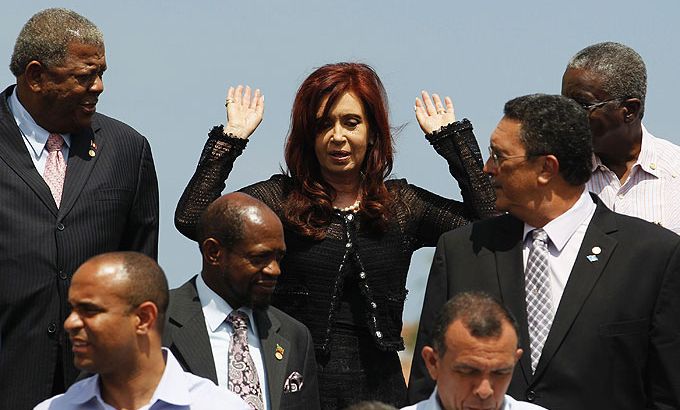Americas summit ends in acrimony
Argentina’s Kirchner walks out as summit unravels amid differences between US and Latin America over Cuba and Falklands.

A summit of nearly 30 leaders of Americas nations has ended without a joint declaration due to divisions over Cuba and the Falkland Islands which prompted the Argentinian and Bolivian presidents to walk out.
The two-day Summit of the Americas in the Colombian city of Cartagena, which ended on Sunday, saw the US and Canada at odds with Latin American nations calling for Cuba to attend future meetings and over Argentina’s claim to the British-controlled South Atlantic islands it calls Las Malvinas.
“There is no declaration because there is no consensus,” said Colombian President Juan Manuel Santos at a closing news conference.
Washington, backed by Ottawa, rebuffed widespread demands to include in the meeting’s final declaration language specifying that Cuba be present in future summits.
They also refused to back Buenos Aires’ claim to the Falklands, prompting Argentine President Cristina Fernandez de Kirchner to storm out of the summit, followed by Bolivia’s Evo Morales.
“[Kirchner] was furious, we are told, because of the lack of full, complete support for Argentina’s claim of control of the Falkland Islands,” Al Jazeera’s Lucia Newman, reporting from Cartagena, said.
“We understand she was very, very angry that [leaders] didn’t even mention the dispute over the islands with the UK.”
“She was overheard saying, ‘This is pointless. Why did I even come here?'”
‘Dictatorship’
Latin America leftist leaders had been insistent that the meeting would be the last regional summit under the auspices of the Organisation of American States (OAS) unless Cuba, the communist island subjected to a US trade embargo since its 1959 revolution, was invited in the future.
“All the countries here in Latin American and the Caribbean want Cuba to be present. But the United States won’t accept,” Morales told reporters late on Saturday. “It’s like a dictatorship.”
Santos, however, said the leaders had agreed to meet again in 2015 in Panama. “Hopefully within three years we can have Cuba” at the summit, he added.
While US President Barack Obama faced public criticism over his country’s objections to Cuban participation, a senior US administration official told reporters that the matter had not been raised during sideline meetings with the leaders of Guatemala, El Salvador, Argentina and Peru.
The foreign ministers of Venezuela, Argentina and Uruguay had said their presidents would not sign any declaration unless the US and Canada removed their veto of future Cuban participation.
Chavez absent
The Cuba issue led Rafael Correa, the Ecuadorean president, to boycott the summit. Daniel Ortega, Nicaragua’s leftist president, also sat out the meeting, though he offered no explanation.
Venezuelan President Hugo Chavez was also absent as he underwent further radiation therapy for cancer in Cuba.
US commercial and political influence in the region has been in decline as China gains on the US as a top trading partner, and many analysts say the summits have become increasingly unwieldy.
“The label ‘Americas’ doesn’t seem to mean that much anymore unless you’re a cartographer,” said analyst Adam Isacson of the Washington Office on Latin America.
The first Summit of the Americas was convened in Miami in 1994 by then-US President Bill Clinton. In subsequent summits, US attempts to create a hemispheric free-trade zone collapsed. South America’s rising left further eroded US influence.
At this weekend’s summit, Obama was also criticised by some leaders for refusing to abandon a drug war that has claimed tens of thousands of lives and undermined governments, although he did not shy from listening to arguments on the other side.
Secret service scandal
US participation was also undermined by an embarrassing scandal allegedly involving prostitutes and US Secret Service agents that widened when the US military said five service members staying at the same hotel might have also been involved in misconduct.
US legislator Peter King told The Associated Press after being briefed on the investigation that “close to” all 11 of the Secret Service agents who were put on leave on Saturday had taken women to their rooms at a hotel nearby where Obama was staying.
He said the women were “presumed to be prostitutes” but investigators were interviewing the agents.
Three waiters at the hotel told reporters that about a dozen US government workers they presumed were the Secret Service agents had spent a week drinking heavily.
One said he witnessed their apparent supervisor line them up and scold them on the hotel’s back terrace on Thursday afternoon.
Immediately thereafter, the men packed their bags and left, said the waiter, who spoke on condition of anonymity because he feared he might lose his job.